Iran To See Greater Unrest In Future: US Intel Official
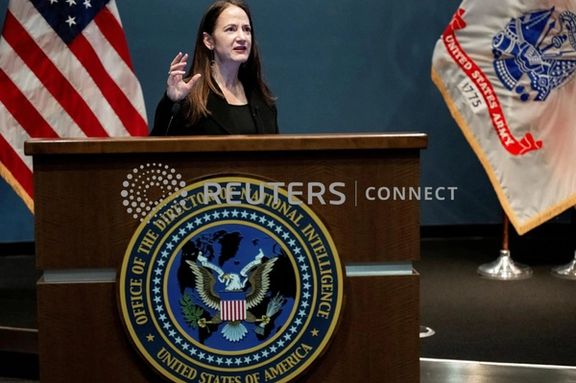
A top US intelligence official has predicted that the nationwide strikes in Iran will gradually expand to become a greater threat to the Islamic Republic.

A top US intelligence official has predicted that the nationwide strikes in Iran will gradually expand to become a greater threat to the Islamic Republic.
Director of National Intelligence Avril Haines on Saturday said the Iranian government does not consider the current protests as an “imminent threat to the regime.”
In an interview with NBC News, Haines added that Iranian authorities may not see the demonstrations as a threat now but could face more unrest because of high inflation and economic uncertainty.
“We’re not seeing the regime perceive this as an imminent threat to their stability and effect,” she said. “On the other hand … they are really having challenges and even nationwide seeing sporadic close-downs of businesses, [which] from our perspective, that’s one of those things that will lead to a greater risk of unrest and instability over time.”
The popular protests demanding an end to Islamic rule started in mid-September when 22-year-old Mahsa Amini was killed in the custody of the so-called “morality police,” igniting the boldest protest movement against the Islamic Republic in its 43-year history.
Over 18,000 people have been arrested since the beginning of the protests, and some death sentences have already been issued for protesters, though none have been carried out. According to US-based HRANA on December 4, 471 protestors and 61 members of the security forces have been killed in protests since September 17.

Iranian Cinema Screenwriters Society has stopped all its activities in protest to the government’s policy of denying people’s demands for change.
In a statement published on Sunday the group said under the current conditions, its members are free to write and produce, or stop their professional activities; but the society, based on its social and professional duty, will cease any communication with government institutions at any level.”
“We deeply understand that in this new era, we are no longer the voice of the people, but it is the people who speak as the strongest social institution, and we have heard them,” added the Board of Directors in the statement.
Within the past 12 weeks of nationwide protests following the death of Mahsa Amini in police custody, several well-known figures from Iranian cinema have expressed solidarity with the protest movement.
Earlier, a member of a committee that follows up with the situation of detained artists said at least 40 filmmakers have been arrested during the national uprising against the Islamic Republic.
In an interview with Shargh daily on Saturday, Mehdi Kouhian said around 150 cinema figures have been summoned, arrested, accused, banned from leaving the country or persecuted in various ways during the recent protests.
He added that most of the detainees are "lesser-known figures whose families have not announced their names yet.”
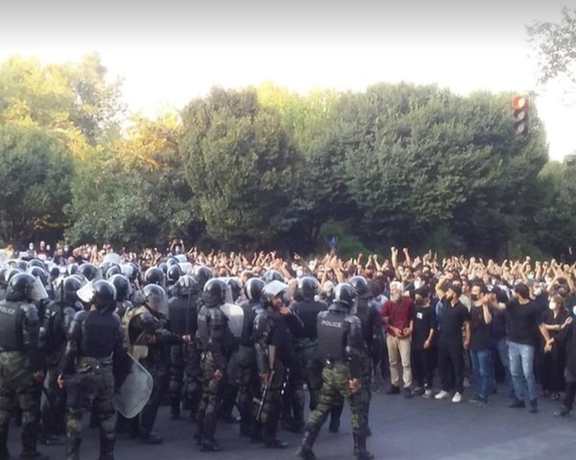
While Iranians were bracing themselves for three-day nationwide strikes and protests starting Monday, several cities on Sunday were scenes of antigovernment rallies.
People in several neighborhoods of the capital Tehran, including Ekbatan and Naziabad, held gatherings on Sunday night chanting slogans against the regime and its ruler Ali Khamenei. “Khamenei listen to the sound of revolution,” rang out in the darkness of night.
According to videos posted on social media, protesters in the northwestern city of Qazvin torched the Intelligence Ministry's banner which called on citizens to call 113 and submit their "security reports" ahead of the three-day nationwide protests and strikes.
Rallies and clashes were also reported in several other cities across the country. Clashes were particularly violent in Murmuri and Abdanan, two small towns in Ilam province, where security forces and Revolutionary Guards were attacking homes and arresting people door-to-door.
Since the current wave of protests began following the death of Mahsa Amini in custody of hijab or the so-called “morality” police, the number of Iranian women who are appearing in public without hijab is growing. But on Sunday, in a move that many people described as a publicity stunt by the Islamic Republic, reports emerged that the hijab police force has been disbanded. The news was widely covered by Persian and foreign media as a measure by the Islamic Republic to calm the unrest. "The same authority which had established this police has shut it down," Iran's Prosecutor General Mohammad Jafar Montazeri was cited as saying by state news agencies.
However, state-run media reported later in the day that the news was not correct. Al-Alam state television said foreign media were depicting Montazeri’s comments as "a retreat on the part of the Islamic Republic from its stance on hijab and religious morality as a result of the protests", but all that could be understood from his comments was that the morality police were not directly related to the judiciary.
Iranian lawmaker Nezamoddin Mousavi, however, signaled a less confrontational approach toward the protests following a closed meeting with several senior Iranian officials, including President Ebrahim Raisi. “Both the administration and parliament insist that paying attention to the people’s demand that is mainly economic is the best way for achieving stability and confronting the riots,” he said.
Numerous grassroot groups have called for protests on December 5, 6, and 7. December 7 is Student Day in Iran and marks the anniversary of the 1953 murder of several students at University of Tehran. It is a traditional day of nationwide rallies. To coincide with Student Day, protesters are calling for strikes by businesses and a rally towards Tehran's Azadi (Freedom) Square, according to posts shared on Twitter.
A statement released to the media by one such grassroot group claimed that people in at least 30 cities have announced that they will hold protests on the set dates.
Similar calls for strike action and mass mobilization have in past weeks led to an escalation of the revolt which has convulsed the country -- the biggest anti-government protests since Iran's 1979 Islamic Revolution.
The activist HRANA news agency said 470 protesters had been killed as of Saturday, including 64 minors. It said 18,210 demonstrators were arrested and 61 members of the security forces were killed.
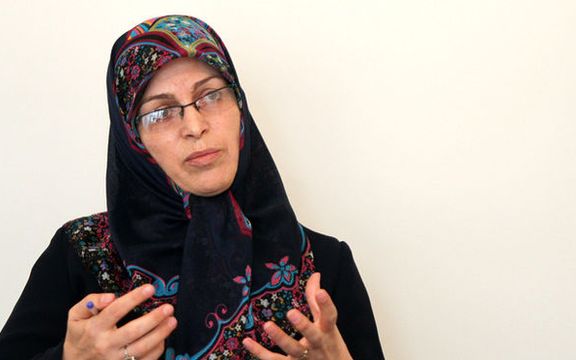
A reformist female politician says she urged Iran's top security official, Ali Shamkhani in a meeting on Sunday to pursue reforms and change the constitution.
Azar Mansouri, the secretary general of Unity of the Nation Party, a coalition of so-called reformists, was quoted by a local media outlet that she and others were invited by national security council secretary Shamkhani to a meeting Sunday. She did not name the other participants, but it is safe to assume many were also reformist politicians.
Mansouri said that she urged Shamkhani to start short-, medium- and long-term reforms in governance,” first by releasing all protesters who have been detained since September, followed by constitutional changes through a “founding assembly”, as a path to emerge from the current political crisis.
The female politician also demanded a policy that would end sanctions against Iran and would help end the current economic crisis, that she said could bring “40 million people” to the streets.
The Islamic Republic leaders should first acknowledge their mistakes and “bridge gaps with the people” by listening to their grievances, Mansouri told Shamkhani.
Hardliners in charge of Iran’s ruling institutions have said time and again that there could be no constitutional changes and no “retreat from principles.” Raising the specter of constitutional change and forming a potentially unpredictable assembly will certainly be viewed by regime hardliners as a challenge to the principle of having a Supreme Leader and the person of Ali Khamenei.
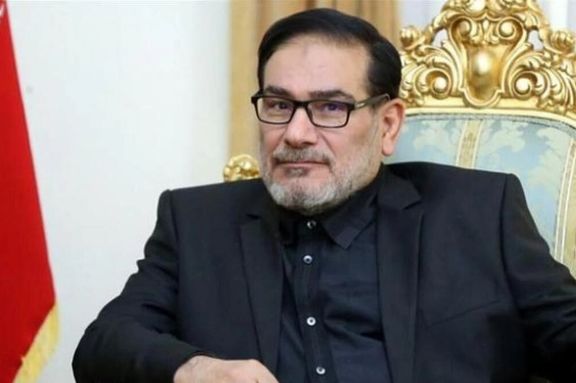
Iran’s reformists are blamed by regime opponents for long pursuing the idea that the Islamic Republic can be reformed and thus giving false hope to the people. Some reformists in the past two months have acknowledged that their thinking has proven wrong, as the extent of deadly violence and untold cruelties against protesters has proven the regime incapable of reforming itself.
In fact, young protesters see little difference between regime hardliners and reformists who want to make incremental changes but keep the Islamic Republic. All slogans and announcements by protesters demand an end to clerical rule.
But according to her own account, Mansouri seems to have also said things that would be annoying to the regime. First, she upheld the memory of all those who were killed during protests since September. She also told Shamkhani that if the regime wants to hold talks with politicians as an attempt at window dressing and as a tool, the whole idea is bound to fail. Discussions to solve the political crisis should be based on “strategic rationality.”
But she was also cautious in her approach by not mentioning the absolute power Khamenei exercises or raise the issue of holding those who are responsible for the killing of hundreds of civilians responsible.
She also did not demand an immediate end to mandatory hijab, and just reminded Shamkhani that having a ‘morality police’ is a bad idea. The issue of systemic discrimination against women, she said, is an issue to be addressed in the long term.
However, she told the top security chief that Iranian women are asking “What has the Islamic society accomplished that would make us proud to use its hijab?”
Despite these remarks, many would still see reformists meeting with security officials as a non-starter, because they believe that now the regime finds itself in deep trouble and wants to save the situation. If protests end and the pressure is lifted, all talk of reform and gestures of pluralism will also end and the clerical-military rulers will go back to what they know best, monopolizing power by relying on force.
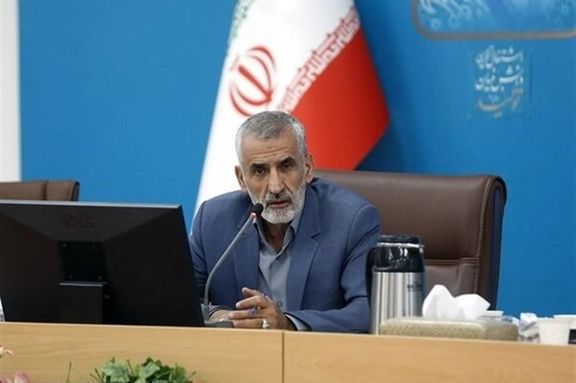
An Iranian official claims “enemies” have offered a lot of money to protesters to attack security agents or chant anti-regime slogans.
Deputy Interior Minister Majid Mirahmadi alleged “some girls were assigned to suggest to young protesters to sleep with them for a few nights in return for anti-security acts,” without providing any documents for his claims.
In an interview with state TV, he claimed that an amount of around $1500 was offered to attack a security agent and about 100 dollars to chant slogans.
Using the term “enemies” is a favorite of Supreme Leader Ali Khamenei to refer to the United States, Israel, US allies in the region and in Europe.
Mirahmadi further alleged that some protesters have received asylum offers in other countries for killing a law enforcement agent.
Following Supreme Leader Ali Khamenei’s lead, Iranian officials claim that the ongoing antigovernment protests across Iran – ignited by death in custody of 22-year-old Mahsa Amini -- are instigated by foreign enemies.
The Washington Post on Thursday quoted some Western officials as saying that the Islamic Republic’s intelligence and security services depend largely on proxies to carry out their plans to kill and kidnap its opponents abroad, “offering hundreds of thousands of dollars to jewel thieves, drug dealers and other criminals in murder-for-hire schemes.”
The Revolutionary Guard Intelligence Organization and the IRGC Quds Force have been mentioned as two main actors in designing these plots.
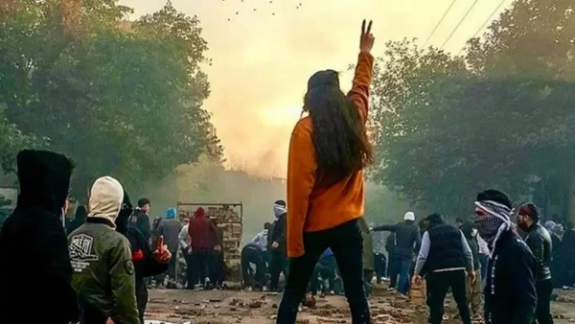
A leaked audio file from a meeting of Iranian regime insiders indicates that at least 80 people detained during nationwide protests are in danger of execution.
The recording is from a recent meeting of the Coalition Council of Islamic Revolution Forces, a conservative coalition of parties that endorsed a joint electoral list for the 2020 Iranian parliament and city council election.
The parliament, elected in a non-competitive election in February 2020, is packed with hardliners and Revolutionary Guard officers, most of whom, including its speaker Mohammad-Bagher Ghalibaf, are members of this coalition.
During the session, Gholam-Ali Haddad-Adel, the head of the coalition and a hardliner politician very close to Supreme Leader Ali Khamenei, asks the secretary, Reza Davari, to brief members about recent developments in the country. In his report, Davari said 80 people have been charged with "Moharebeh" and "corruption on earth.” Mohareb (muharib), which means warrior in Arabic is a term in Iran’s Islamic law that means an "enemy of God” or “war against God,” which carries the death penalty. “Corruption on earth” is also another term that carries the death penalty.
He said that Khamenei preferred the detained protesters be executed based on the principle of "qisas" -- or punishment in kind, which in the Islamic criminal code can be applicable in cases of bodily harm – for killing of Basij paramilitary forces. The regime has on many occasions used the Quranic principle -- similar to “an eye for an eye” or the law of talion – to execute protesters after charging them with killing security agents.
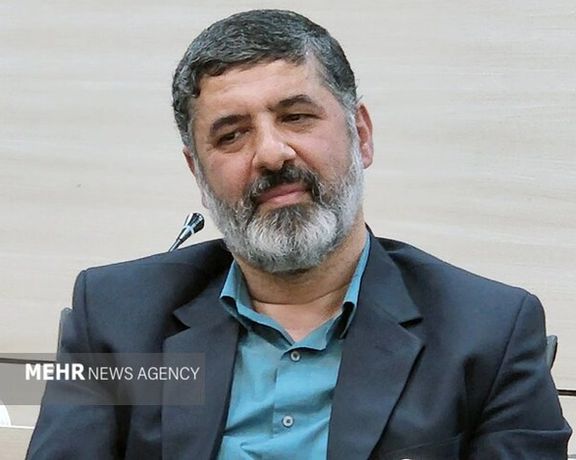
Davari added that if the authorities wanted to execute the protesters based on qisas, they could only issue death sentences for about 10 people, therefore they decided to charge the protesters with “moharebeh” and “corruption on earth” that ensure the execution of more prisoners. He noted that the largest number of such indictments were issued in the provinces of Tehran, Alborz, Fars, Khorasan Razavi and Esfahan.
Any act of defiance can be arbitrarily interpreted as ‘war against god’ in a judicial system that ignores due process and is controlled by the authoritarian ruler Khamenei.
According to recent reports, at least 10 underage protesters are also facing death sentences for the “moharebeh” and “corruption on earth”. During the popular uprising in Iran, over 18,000 citizens have been arrested and it is not clear how many of them were accused of “corruption on earth” and “war against God”.
Davari went on to say that for some of the protesters arrested in Kurdish-majority cities “terrorism” charges were issued so that they could be sentenced to death.
In November, a group of 227 parliament members called on the Judiciary to issue death sentences for people arrested during the ongoing antigovernment protests.
Among other things that were discussed during the session, records of which Iran International obtained, was the brutal crackdown on protesters in Zahedan, the provincial capital of Sistan-Baluchestan, known as the Bloody Friday. It took place September 30, when security forces killed close to 100 people, including women and children. The Islamic Republic never acknowledged the killings of ordinary people and always claimed that security forces only opened fire at those who wanted to attack a police station in the city. However, in the leaked audio, Davari admitted that one of the officers who was stationed on the roof of the police building “made a grave mistake and shot at people” who were not even near the police station, killing some men, women, and children who were not even protesting.
Repeated leaks by hackers and insiders in recent days has unmasked the inner thinking and unpleasant secrets of the Islamic Republic, putting the regime in an uncomfortable situation.